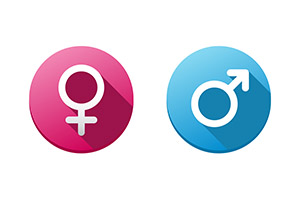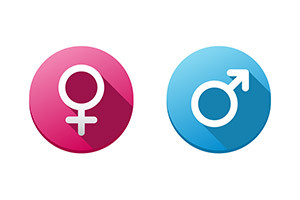Sex, Sexuality & Sexual Identity
“Sexuality involves our beliefs and feelings about being male or female and the roles and expectations associated with them. It involves our behaviours, interactions and relationships with others of the same and opposite sex. It includes how we feel about our body and ourselves. Sexuality is a process of learning that evolves throughout our lives, an active, inseparable part of who we are”. (Couwenhoven, 2001)
Many of us have a limited comprehension of the ways in which our sexual socialisation has sculpted our values and attitudes to sex. We are sexual beings for the duration of our life time and as such have needs regardless of our level of sexual activity. According to Painter and Adams, sexuality involves our relationships with ourselves, those around us and the society in which we live, whether we identify as gay, heterosexual, lesbian, bisexual or celibate (2001).
Given that a person’s biological gender is sometimes different to their gender identity, transgender individuals should also be recognised beside the above categories. Employing the holistic model Waterford Counselling Centre encourages clients to conceptualise their sexuality as extending beyond merely sexual intercourse beneath the following multi-faceted factors:
- Sensuality
- Intimacy
- Sexual Identity
- Spirituality
- Sexual Health & Reproduction
- Sexualisation
“Sexual health is a state of physical, emotional, mental and social wellbeing related to sexuality; it is not merely the absence of disease, dysfunction or infirmity. Sexual health requires a positive and respectful approach to sexual health and sexual relationships, as well as the possibility of having pleasurable and safe sex experiences, free of coercion, discrimination and violence. For sexual health to attained and maintained, the sexual rights of all persons must be respected and fulfilled” (World Health Organisation, 2002).
The above definition of sexual heath is also a constructive baseline when engaging with clients electing to undertake work related to their gender identity, to gain a greater sense of who they are sexually. Sexual identity describes not only gender identity, but it also comprises of our gender roles, gender bias, and sexual orientation.
Rather than perceiving any aspect of sexual or gender identity as problematic, LGBT clients are instead afforded the opportunity to affirmatively embrace their sexuality within the therapeutic space. Some LGBT clients arrive for counselling or psychotherapy to address a seemingly unrelated issue, but our work may eventually concentrate largely on that individual’s past or present sexual identity as the toll taken from their inner struggles inevitably rises to the surface.
Funded by The National Office for Suicide Prevention, the Supporting LGBT Lives study unveiled the following key findings about coming out, mental health and suicidality:
- 27% had self harmed and 85% of these did so on more than one occasion
- 16 years was the average age of the first incidence of self-harm
- 40% of females and 20% of females self-harmed
- 18% had attempted suicide and 85% of these linked their action to their LGBT identity
- 5 years was the average age of the first suicide attempt
- 24% of females and 15% of males attempted suicide at least once
Moreover it was also found that the 3 most common LGBT-specific stressors were:
- Fear of rejection when considering coming out
- Negative school experiences
- Experiences of harassment and victimisation
So how can therapy help?
Addiction, depression, anti-social behaviours and suicidal ideation may be singular, or combined symptomatic expressions of repressed sexuality and/or the effects of a life lived in the shadows of fear, violence, bullying, and public condemnation. LGBT affirmative counselling and psychotherapy seeks to counter the shame and self-loathing outcomes of homophobic, biphobic or transphobic experiences overtly and covertly manifest within our families of origin, schools, communities, religions and society.
Waterford Counselling Centre can support you during this complex and difficult process. Working together we can examine ways in which the patterns you have unintentionally and unknowingly created, may actually be perpetuating a vicious cycle of low self-esteem. Rather than serving their intended damage limitation purpose, your rigid, self-judgemental thought processes and defensive behaviours can exacerbate feelings of guilt, shame, inadequacy, hopelessness, anger and powerlessness.
Acknowledging the existence and legitimacy of these psychologically crippling emotions, therapy can be a vehicle to access and release you from their potentially damaging and indefinite stranglehold. Typical areas that we can work on are coming out, disclosing to others, fear of rejection, homophobic and transgender bullying, building resilience, accessing LGBT-specific supports and resources, transitioning, and psychological distress.
Seeking and accepting support is a strength and not a weakness so please feel free to contact me to take the next step.
Sex, Sexuality & Sexual Identity
“Sexuality involves our beliefs and feelings about being male or female and the roles and expectations associated with them. It involves our behaviours, interactions and relationships with others of the same and opposite sex. It includes how we feel about our body and ourselves. Sexuality is a process of learning that evolves throughout our lives, an active, inseparable part of who we are”. (Couwenhoven, 2001)
Many of us have a limited comprehension of the ways in which our sexual socialisation has sculpted our values and attitudes to sex. We are sexual beings for the duration of our life time and as such have needs regardless of our level of sexual activity. According to Painter and Adams, sexuality involves our relationships with ourselves, those around us and the society in which we live, whether we identify as gay, heterosexual, lesbian, bisexual or celibate (2001).
Given that a person’s biological gender is sometimes different to their gender identity, transgender individuals should also be recognised beside the above categories. Employing the holistic model Waterford Counselling Centre encourages clients to conceptualise their sexuality as extending beyond merely sexual intercourse beneath the following multi-faceted factors:
- Sensuality
- Intimacy
- Sexual Identity
- Spirituality
- Sexual Health & Reproduction
- Sexualisation
“Sexual health is a state of physical, emotional, mental and social wellbeing related to sexuality; it is not merely the absence of disease, dysfunction or infirmity. Sexual health requires a positive and respectful approach to sexual health and sexual relationships, as well as the possibility of having pleasurable and safe sex experiences, free of coercion, discrimination and violence. For sexual health to attained and maintained, the sexual rights of all persons must be respected and fulfilled” (World Health Organisation, 2002).
The above definition of sexual heath is also a constructive baseline when engaging with clients electing to undertake work related to their gender identity, to gain a greater sense of who they are sexually. Sexual identity describes not only gender identity, but it also comprises of our gender roles, gender bias, and sexual orientation.
Rather than perceiving any aspect of sexual or gender identity as problematic, LGBT clients are instead afforded the opportunity to affirmatively embrace their sexuality within the therapeutic space. Some LGBT clients arrive for counselling or psychotherapy to address a seemingly unrelated issue, but our work may eventually concentrate largely on that individual’s past or present sexual identity as the toll taken from their inner struggles inevitably rises to the surface.
Funded by The National Office for Suicide Prevention, the Supporting LGBT Lives study unveiled the following key findings about coming out, mental health and suicidality:
- 27% had self harmed and 85% of these did so on more than one occasion
- 16 years was the average age of the first incidence of self-harm
- 40% of females and 20% of females self-harmed
- 18% had attempted suicide and 85% of these linked their action to their LGBT identity
- 5 years was the average age of the first suicide attempt
- 24% of females and 15% of males attempted suicide at least once
Moreover it was also found that the 3 most common LGBT-specific stressors were:
- Fear of rejection when considering coming out
- Negative school experiences
- Experiences of harassment and victimisation
So how can therapy help?
Addiction, depression, anti-social behaviours and suicidal ideation may be singular, or combined symptomatic expressions of repressed sexuality and/or the effects of a life lived in the shadows of fear, violence, bullying, and public condemnation. LGBT affirmative counselling and psychotherapy seeks to counter the shame and self-loathing outcomes of homophobic, biphobic or transphobic experiences overtly and covertly manifest within our families of origin, schools, communities, religions and society.
Waterford Counselling Centre can support you during this complex and difficult process. Working together we can examine ways in which the patterns you have unintentionally and unknowingly created, may actually be perpetuating a vicious cycle of low self-esteem. Rather than serving their intended damage limitation purpose, your rigid, self-judgemental thought processes and defensive behaviours can exacerbate feelings of guilt, shame, inadequacy, hopelessness, anger and powerlessness.
Acknowledging the existence and legitimacy of these psychologically crippling emotions, therapy can be a vehicle to access and release you from their potentially damaging and indefinite stranglehold. Typical areas that we can work on are coming out, disclosing to others, fear of rejection, homophobic and transgender bullying, building resilience, accessing LGBT-specific supports and resources, transitioning, and psychological distress.
Seeking and accepting support is a strength and not a weakness so please feel free to contact me to take the next step.


